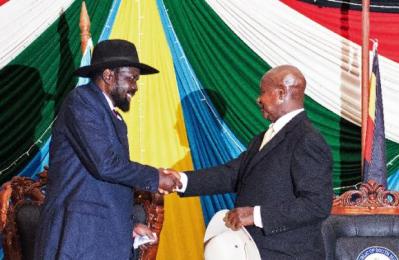S. Sudanese in Ethiopia welcome peace deal signed by president Kiir
By Tesfa-Alem Tekle
August 26, 2015 (ADDIS ABABA) – Exiled South Sudanese in Ethiopia welcomed a peace agreement signed by President Salva Kiir, aimed to end a 20-months long conflict with rebels led by former vice president, Riek Machar.

The signing ceremony was witnessed by regional leaders including Ethiopian Prime Minister, Hailemariam Desalegn, President Uhuru Kenyatta of Kenya, President Yoweri Museveni of Uganda, and Sudan’s First Vice-President Bakri Hassan Saleh.
Kiir signed the same compromised peace deal signed in Addis Ababa last week by rebel leader Machar.
Despite signing the agreement, the South Sudanese president however has expressed “serious reservations” he did not specify with regard to the mediation process, but said he would sign the deal even if his reservations were not considered in the document.
“With all those reservations that we have, we will sign this document” he told regional leaders before he signed, adding “some features of the document are not in the interest of just and lasting peace.”
“We had only one of the two options, the option of an imposed peace or the option of a continued war,” he added.
Although South Sudanese in Ethiopia commended the signed agreement they however have expressed concerns on whether the two warring factions would implement it or not.
“This is a great commitment by both warring factions to bring this senseless war to an end” South Sudan Peace Ambassador, Gatwech Koak Nyuon, told Sudan Tribune.
.
“Signing is not the difficult part, but implementation is the biggest challenge which we must collaboratively work with President Kiir and Machar to bring the lasting peace to our beloved Nation” added Gatwech, calling on all South Sudanese in Diaspora and at home to work for peace.
The office of the SPLM/SPLA Mission to Ethiopia and to the African Union (AU) also today welcomed the president’s move to sign the compromised peace pact and end the “senseless war” the rebels said was imposed on the people of South Sudan by president Kiir.
“This is a very good decision to bring this senseless war to an end and build the lives of our people” said David Dang, deputy representative of the SPLM/SPLA to the AU.
The signed agreement means the two rival factions will form at least a 30 months long transitional government which allows Kiir’s side to take 53% of the positions in the government and Machar’s side 33%. The remaining 14% positions will be taken by the former detainees and other political parties.
Meanwhile the U.S. based organization, Enough Project, has welcomed the South Sudan Peace Agreement, but has warned of tougher challenges ahead in the journey towards fully implementing it and restoring peace in the country.
Enough Project said the challenges of implementing the agreement far exceeds the challenges of negotiating one.
“Both sides contain hard-line factions and interests that openly oppose the signing of the compromise agreement and continue to benefit financially from the misery of the South Sudanese people,” it said today in a statement.
“There will be winners and losers as a result of this deal, and the losers could very well attempt to undermine the agreement, potentially through further violence.”
It urged regional and international communities to maintain their diplomatic and financial pressure on both sides so as the agreement is implemented effectively.
If the agreement is implemented, Kiir will retain the presidency while the armed opposition group will secure a post of first vice president.
Conflict in the world’s youngest nation broke out in December 2013 when President Kiir accused his sacked deputy Machar of plotting a coup, an allegation the latter denies.
The fighting has killed tens of thousands and displaced millions.
(ST)
